Henry Ford Museum
Physics, Technology and Engineering in Automobile Racing
Start your engines! This five-lesson unit introduces physics and Newton's laws through automobile racing. Each lesson includes background information, a student worksheet, and an answer key. There are also culminating project...
Curated OER
Vectors
Students differentiate distance and displacement. In this physics lesson, students use formulas to calculate for displacement. They draw vectors using the grid.
Curated OER
Time and Motion on Track
Students create a motion diagram for a distance and motion project. In this time and motion lesson, students take turns walking around the track and take pictures of their motion. Students measure the distances and determine each...
Curated OER
Worksheet 5 - Vectors & Physics
In this vectors worksheet, students determine the amount of work it takes to move objects, they determine if vectors are parallel or orthogonal and identify the displacement direction and the force direction. This one-page worksheet...
Urbana School District
Energy, Work, Simple Machines
The tension of the 236 strings in a grand piano exert a combined force of 20 tons on the cast iron frame. The presentation includes topics such as work, forms of energy, conservation of energy, gravitational and elastic potential energy,...
It's About Time
Making Waves
Young scientists use Slinkys to better understand waves. After creating and measuring many aspects of waves, they complete a handout and homework questions. The resource also introduces the final project for the chapter, though it does...
Urbana School District
Vectors
I don't always make vector jokes, but when I do, IJK. Vector addition using multiple methods, scalar multiplication, vector subtraction, vector components, relative velocities, free body diagrams, and so much more Are covered in this...
Curated OER
Numerical Determination of Drag Coefficients
Young scholars create a video of an object falling with a drag. In this physics lesson, students calculate drag coefficient using data from Logger Pro. They calculate velocity and acceleration of the object.
Curated OER
Velocity vs. Time
Twelfth graders read and interpret v-t graphs. After studying velocity and time, 12th graders read graphs to calculate the acceleration of a moving body and determine the distance and displacement of a body. Students explore the...
Curated OER
Hang Time
Students simulate the motion of a fly ball with different winds. They use a partner to provide the simulated wind. Students draw a baseball diamond and the field on a piece of paper. They drag the pen across the paper to show the path of...
Curated OER
Marble Madness
Students determine the velocity of a marble rolling down the incline. In this physics lesson plan, students identify the independent and dependent variables in the experiment. They construct and analyze a graph.
Curated OER
Bungee Man Lab
Students explore the motion of a toy bungee jumper using the scientific method. They view a video of a bungee jumper and discuss what can be measured about a bungee jump. Students discuss the scientific mehtod and how to design an...
Alabama Learning Exchange
Energy and Work Amusement Park Style
High schoolers distinguish between kinetic and potential energy. They recognize that energy can change from one form to other forms. They identify and describe several forms of energy.
Curated OER
Angles: Angles, Angles, Everywhere
Young scholars practice estiminating and measuring angles. After watching a short video, they identify angles in objects in the classroom and their homes. In groups, they participate in activities in which they are given a scenerio and...
Flipping Physics
AP Physics 1: Kinematics Review
Test takers stressing out over the upcoming exam? Help them prepare for the AP Physics i exam with this fast-paced video that includes a complete guide to everything related to kinematics. Also included are some common errors and...
Curated OER
Waves
An incredibly colorful PowerPoint presents all the facts and definitions about waves that you could need for beginning physical scientists. There are several useful links to online animations of wave action. This may have been produced...
K5 Learning
Why Does the Ocean have Waves?
Six short answer questions challenge scholars to show what they know after reading an informational text that examines waves—what they are, what causes them, and how different Earth factors affect their size and strength.
Curated OER
Exterior Ballistics
Students explore velocity and trajectory. Using exterior ballistics rules, students predetermine the path of an artillery shell. Given equations and the firing angle, students determine the velocity and horizontal travel. Students...
Curated OER
Energy, Work and Power
In this energy, work and power worksheet, students solve 12 problems about circuits, electric motors, Ohm's Law and electric currents.
Curated OER
Angles: Angles, Angles, Everywhere
Students estimate and accurately measure the size of angles communicate with the appropriate geometric terms and symbols to describe and name angles, lines, line segments, rays
Curated OER
Wave Terms and Concepts
In this waves worksheet, students define 23 vocabulary words associated with the different types of waves and how waves are measured. Students complete 23 matching terms with definitions and draw the superposition of two waves shown.
Curated OER
Computer Interfacing: Frequency Measurement - The Doppler Effect
Students explore the Dollper effect by finding the frequency and velocity of sound. In this velocity lesson, students determine the impulse during a collision by using their data and a software program.
Curated OER
Cams
Young scholars explore plate and barrel cams. They discuss the differences between the two cams. Students identify a base and prime circle and they draw a plate cam using the provided details.
Physics Classroom
The Physics Classroom: 1 D Kinematics: Describing Motion Distance & Displa [Pdf]
A collection of high-school level physics problems with an emphasis on kinematics where learners practice describing an object's motion.


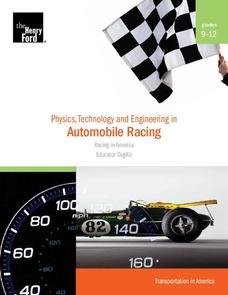



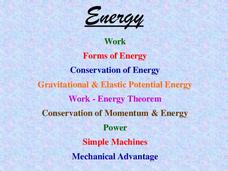

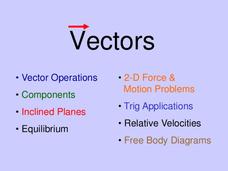

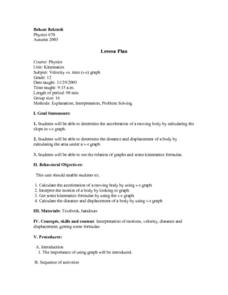




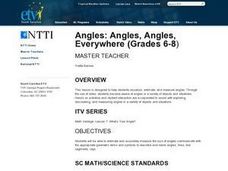

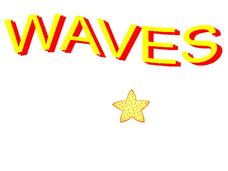






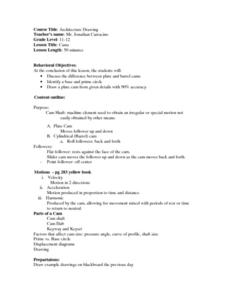
![The Physics Classroom: 1 D Kinematics: Describing Motion Distance & Displa [Pdf] Unknown Type The Physics Classroom: 1 D Kinematics: Describing Motion Distance & Displa [Pdf] Unknown Type](https://d15y2dacu3jp90.cloudfront.net/images/attachment_defaults/resource/large/FPO-knovation.png)